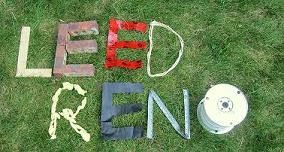In a nutshell: LEED or "Leadership in Energy and Environmental Design" is a set of international guidelines for green or sustainable buildings. The program looks at 7 key areas:
- Location and Linkages - where is it built and its accessibility
- Sustainable Sites - how green is your yard?
- Water Efficiency - is your home a water hog?
- Energy and Atmosphere - how efficiently does it use energy?
- Material and Resources - use of green products and minimize waste
- Indoor Environmental Quality - minimize indoor pollutants
- Awareness and Education - inform the world
In each category you have to earn a certain amount of points and/or meet a certain number of prerequisites. This means your project needs to be balanced to some degree. You could have a "net zero" solar powered house but if you install a circa 1950s 30L per flush toilet you're outta luck.
The more points you get the higher your classification: "Certified", "Silver", "Gold, or "Platinum". We are planning on Certified with a possible stretch to Silver.
So why bother?
So first off why bother with "green" renos? I think we'll answer that question in detail as we go along but basically it is important to us. If efficiency and reducing your footprint are not your cup of tea then LEED is not for you.
But why bother with LEED? Why not just do green renos and forget the hassle and cost of getting certified? The various LEED websites offer a long laundry list of benefits, for us it came down to a handful of reasons mainly associated with our last reno project. When we were in Winnipeg we completed significant renovations, most with a "eco" flavour: cork floors, recycled paint, extra insulation, etc. but looking back there was a lot we could have done better:
Keeps us Honest
In every renovation, there are trade-offs (cost vs. quality as an example). By certifying the project we need to ensure that none of the trade-offs that we make
compromise on the environmental footprint of our project. And not just on the product but the process.
As an example below is a picture of our Winnipeg basement after the demolition phase.

Now I won't lie. Spending two days with a sledge hammer destroying a place was a lot of fun. At the end the kind folks from 1-800-Got-Junk whisked away our debris and I started building. This time around I have to log construction debris and how much is going to a land fill. So instead of demolition it becomes deconstruction. Wood is salvaged (already used all second material for my work bench) and recycled. Looking back at that picture and thinking how much material went straight to the dump: it pisses me off. Not just from the green side of things but I threw out good quality lumber and went out a probably paid money for a poorer quality product.
Guidance
Sometimes making the right environmental choices isn't that clear cut. For example I wouldn't have thought that installing a sprinkler system was very eco-friendly. But if you have a traditional lawn a sprinkler system that applies the optimal water at the optimal time will definitely reduce water usage over dragging the sprinkler out on a Sunday afternoon.
Having guidelines to follow and people to support you through the process will help both of us become more knowledgeable about green building.
Resale
I can't say whether or not a LEED home is worth more. I am sure there are studies out there that say it is. But when this building changes hands I want the next occupants to know that they have a green home. When we sold our Winnipeg home, the prospective owners may have heard about some of the improvements... do they still remember? Will the next owners know that the insulation was upgraded? I want future owners of this house to know and hopefully care that it meets higher standards.
Being a Leader
I care about the environment and it is not often that I really get to go above and beyond. LEED certification for existing homes is fairly new and so making it a DIY project while you are living in the home is pretty rare. It is nice to feel like you are breaking new ground and I hope others can learn from us.

Good luck to you and your family in achieving your LEED goals!
ReplyDeleteYour biggest gain may be the influence you have on others to be greener in the choices they make.
Gary & Anne